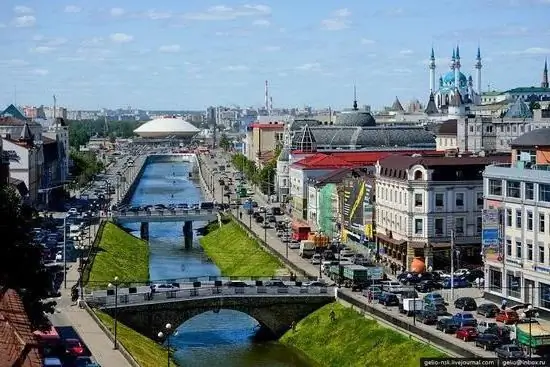- Author Henry Conors [email protected].
- Public 2024-02-12 02:41.
- Last modified 2025-01-23 09:07.
The question of where Vysotsky lived in Moscow is of interest to many fans of his work. This is a Soviet actor and singer-songwriter, whose popularity flourished in the 1960s and 1970s. He spent his whole life in the capital. So, there are many places associated with it in this city. His fans often want to walk along the streets of Moscow, visit the addresses with which this or that period of his life was associated.
The Ballad of Childhood

Some of the places where Vysotsky lived in Moscow are reflected in his work. For example, in the famous "Ballad of Childhood". It contains these lines:
The first time I got freedom
By decree of the thirty-eighth.
I wish I knew who had been hustling for so long -
Would win back on a scoundrel, But I was born and lived and survived, The house on First Meshchanskaya at the end.
In this song, the poet talks about hisbirth. Vladimir Vysotsky was born on January 25, 1938 in maternity hospital No. 8, located in the Dzerzhinsky district of the capital. He was in the house number 61/2 on the 3rd Meshchanskaya street.
This was the historic building of the Old Catherine's Hospital, which was opened in 1776 by decree of the Empress, who gave the name to this medical institution. It was only the second hospital in Moscow whose services could be used by members of the civilian population. The first was the Pavlovsk hospital, which appeared 13 years earlier.
In 1962, this street was renamed in honor of the actor Mikhail Shchepkin. Moreover, in the house where the poet was born, there is still a medical facility. Now it is the Mikhail Fedorovich Vladimirsky Clinical Research Institute.
In 2015, a memorial plaque appeared on the building mentioning that Vysotsky was born here.
First address

In the same lines of "The Ballad of Childhood" Vysotsky's first Moscow address is mentioned. Together with his parents, the future poet settled in a communal apartment at 126 First Meshchanskaya Street.
According to the recollections of his mother, Nina Maksimovna, their apartment had bright, wide and spacious corridors. There were gas stoves in the kitchen. Everyone lived together, the hostesses communicated with each other while they cooked dinners and washed, the children played in the corridor. Volodya grew up as a smart and pretty child, who was loved by everyone without exception. He could enter any of the 17 rooms. Somewhere he was treated to candy, andsweet bun somewhere.
This house of Vysotsky in Moscow has not survived to our time. It was demolished in 1955. In 1956, a new building appeared in its place, which is now located at Prospekt Mira, 76.
It was from this communal apartment that the poet's father went to the front when the Great Patriotic War began. Little Volodya himself went to evacuation with his mother.
They returned to the capital in 1943, after living four more years in this communal apartment. It was from First Meshchanskaya Street that Vysotsky went to first grade. He studied at school number 273 in the Rostokinsky district.
On Bolshoi Karetny
The following address, where Vysotsky lived in Moscow, is considered one of the most famous. In many ways, and because it is mentioned in the famous song, which is called "On the Bolshoy Karetny".
Where are your seventeen years old?
On Bolshoi Karetny.
Where are your seventeen troubles?
On Bolshoi Karetny.
Where's your black gun?
On Bolshoi Karetny.
Where are you today?
On Bolshoi Karetny…
The poet's father returned from the front, but in 1947 he left the family. Volodya began to live with his father and stepmother Evgenia Likhalatova. Vysotsky's father was a military man. Until 1949, he served in Germany, where he moved his family.
Back in Moscow, they settled on Bolshoi Karetny Lane. From here, Vladimir went to the fifth grade of secondary school No. 186, which was located nearby on the same street. Today, this building houses the main building of the Law Academy of the MinistryJustice of the Russian Federation.
It is worth noting that Volodya was never a home child, which was also reflected in Vysotsky's song "On the Bolshoy Karetny". He spent a lot of time on the street among friends, many of whom later went into crime. All the "criminal" part of creativity originated here: on Bolshoy Karetny Lane, as well as on Samotek (this is an unofficial toponym for the intersection of Tsvetnoy Boulevard with Sadovo-Samotechnaya Street). Vysotsky often even called Samotek his favorite place in the capital.
New home

After graduating from school, he moved to his mother after the construction of a new house on Prospekt Mira, 76. Volodya lived here until 1962.
During this period, he graduated from high school. Relatives urged him to enter the Engineering and Construction Institute at the Faculty of Mechanics, so that the young man could get a profession that would then constantly feed him. Vysotsky obeyed, but soon left the university to go to the acting department of the Moscow Art Theater School.
At the same time, he often returned to Bolshoi Karetny, where his friends and buddies stayed. It was here that he began to perform his first songs. Vysotsky himself later admitted that initially his works were written for a narrow group of the closest people. It was a company that included Lev Kocharyan, Andrei Tarkovsky, Vasily Shukshin. There developed a relaxed and friendly manner. The poet felt at ease among close friends.
The song itself "On the Bolshoi Karetny" Vysotskydedicated to Kocharyan. This is a director, actor and screenwriter who was the first to record his works on a tape recorder.
Birth of sons
In 1963, Vysotsky and his mother received an apartment in the south-west of the capital. They settled in Cheryomushki at the address: Shvernik street, house 11, building 4.
It was one of the first attempts to master new forms of life. Complex development was carried out: houses with playgrounds, schools and kindergartens, all adjacent infrastructure were immediately built. It was a typical 5-story Khrushchev building, which has now been demolished, considering it to be an emergency and dilapidated fund.
By that time, the hero of our article already had a son, Arkady. In 1964, Nikita was born to a little-known actor Vysotsky and Lyudmila Abramova. At the same time, the poet was actually still married to his first wife, Iza, with whom he could not file a divorce for a long time. He managed to officially register relations with Abramova only in 1965.
And this marriage did not last long. In 1968, the couple broke up, but the time spent in Cheryomushki is considered by many to be significant in the work of Vysotsky. Then Vladimir Semenovich began to play in the famous Taganka Theater, and his songs became popular.
The family he left behind moved into a large apartment on Begovaya Street.
Romance with Marina Vladi

After parting with Abramova, Vysotsky began to live with a popular French actress - Marina Vladi. They rented a 3-room apartment from their friends at the address: Matveevskaya street, house 6. In the south-west of the capit althe lovers spent three years.
Son Nikita Vysotsky, who today is trying in every possible way to popularize his father's work, recalls that everything in this apartment was furnished in a Western style. Bean bags and inflatable furniture are everywhere. Of course, such avant-garde novelties were unfamiliar to Muscovites. Marina Vlady brought all this from France.
Hotel room

After that, there were many other places where Vysotsky lived in Moscow. For example, for some time he and Marina settled in the Sovetskaya Hotel. It was a popular place among the metropolitan bohemia. Before the revolution, the famous Yar restaurant was located here, where Kuprin, Chaliapin, Chekhov, Gorky and even Grigory Rasputin liked to visit.
The restaurant was closed after the October Revolution. In 1952, the building was rebuilt in the Stalinist Empire style, adding a building that housed hotel rooms. It was an outstanding hotel project, for which its authors even received the Stalin Prize.
During Vysotsky's time, the Sovetskaya Hotel, located at 32 Leningradsky Prospekt, was considered an elite place. The restaurant located next to her has become a place of attraction for theater, film and sports stars.
Own apartment

Vysotsky's own apartment in Moscow appeared only in 1975. He moved into a newly built 14-story building, where he remained until his death, until 1980.
With Marina Vladi, he lived on the street. Malaya Georgian,28, apartment 30. There is also a mention of this apartment in his work in the song "My black man in a gray suit …":
Gossip about the dacha and salary:
Supposedly, there is a lot of money, I forge it at night.
I'll give everything - take it at no extra charge
My three-room cell…
It was a very spacious Soviet-era apartment of 115 square meters. Vysotsky entered it already in the status of an all-Union celebrity.
True, Marina Vladi recalls that at first they constantly had to face difficulties. Batteries didn't heat up at all. The stove was constantly burning in the kitchen, the only way to escape from the cold. We had to stay indoors in hats, quilted jackets and fur boots. The windows were covered with ice.
Malaya Gruzinskaya, 28 - Vysotsky's most famous Moscow address. The poet managed to get an apartment, as it was a cooperative house of the Union of Graphic Artists of Moscow. The house allocated quotas for everyone who was related to painting.
Situation on Malaya Gruzinskaya
Describing the situation in this apartment, Nikita Vysotsky, who often visited it in the late 1970s, claims that now it would be recognized as an ordinary average Moscow apartment. At that time, the furnishings in it were considered a real luxury.
Three rooms were renovated with original furniture. The concierge was sitting in the entrance. The walls were covered with paint instead of wallpaper, and the standard linoleum was replaced with a scarce floor covering at that time.
At the same time, the apartment reignedan absolute mix of styles. Modern upholstered furniture that Vlady brought from France was side by side with antiques from the 19th century bought at a sale.
At the same time, classical luxury was located next to handicraft items, knocked together by soldiers from the construction battalion, which Vysotsky brought home especially for this. From unhewn and rough boards, they made a kitchen table, wardrobe and benches.
It is believed that Vysotsky did not like this apartment. But most researchers tend to think that this is due to the fact that in the late 1970s one of the most difficult periods in his life began, when physical ailment and he alth problems were added to spiritual suffering.
Last days
In 1979, on tour in Bukhara, Vysotsky experienced clinical death. In the summer of 1980, his condition deteriorated greatly.
The last months of his life he spent in this apartment, waging an unequal struggle with drug addiction.
On July 23, a team of resuscitators from the Sklifosovsky Institute arrived at Malaya Gruzinskaya. Doctors put the patient into a drug-induced sleep to cleanse the body, as the poet broke down again. During the night, his heart stopped because of a heart attack.
Museum

Today, many tourists know where the Vysotsky Museum is in Moscow. This is a scientific and cultural center that collects, studies and preserves everything related to his work.
It is located at Vysotsky Street, Building 3, Building 1. It is led by the son of the poet Nikita. The museum was created almostimmediately after the death of the hero of our article. Officially it is called "Vysotsky's House on Taganka". There are several halls in the permanent exhibition, the name of which was given by lines from the songs of a popular artist.






